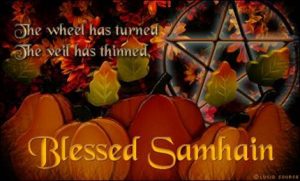
October 31st is Halloween, but did you know that many of our modern Halloween celebrations are actually based on an ancient Celtic festival called Samhain (pronounced sah-win)?
Samhain is a pagan festival rooted in ancient Celtic spiritual traditions. Samhain is usually celebrated from October 31st to November 1st, although the dates may vary as some individuals celebrate the holiday at a specific time/date based on astrological alignments, or the date that falls on the midpoint between the Fall Equinox and the Winter Solstice. Samhain is one of the 8 Sabbats that many Pagan’s celebrate each year, and is one of the 4 Greater Sabbats.
At its roots, Samhain is an agricultural festival, marking the final harvest of the year as communities began to prepare for the coming chill of winter. The festival marks the time of year when the transition to winter begins and is on the “border line” of summer and winter, or light and darkness. Samhain is a Gaelic word that translates to “Summers End”. The ancient Celts viewed the year as two halves, the light and the dark and Samhain marks the beginning of the transition between the two halves. Samhain is considered to be a fire festival, and was often celebrated with a large bonfire that was meant to appease the Deities in the hopes that they would bless future crop yields.
Samhain also marks the day when it is believed that the work of deities and spirits become visible to mankind, meaning that humans would both attempt to connect with their deities while also protecting themselves from the more malevolent spirits that may try to cross the veil. It is believed that the veil between worlds is at it’s thinnest on Samhain, and many of our modern Halloween practises are rooted in this belief. There are deep spiritual meanings and practises associated with the festival for many in the modern day, and many of our Halloween traditions link directly to ancient practises.
For example:
1. Trick or treating: Since spirits were thought to cross the veil, it was expected that they may play tricks. Individuals (often children and youth) would take the opportunity to prank their neighbours and blame it on otherworldly tricksters. It was also common to go house to house to request food donations in exchange for songs or poems. These traditions have translated into modern day trick or treating.
2. Costumes: In ancient times, individuals would dress up in costumes (often as animals, monsters or other scary beasts) in an attempt to fool the otherworldly spirits who may mean them harm. These costumes were meant to scare the spirits away, or confuse them, and therefore keep the wearer safe.
3. Jack-o’-lanterns: Modern day carved pumpkins are believed to have originated from the practise of carving turnips that were lit in an attempt to confuse or redirected spirits, as they were believed to act as a deterrent for wayward spirits.
4. For many, it became tradition to leave out extra plates/meals at dinner time on Samhain for family members who has passed on. This was meant to welcome the spirits of loved ones back into the home while the veil was thinned. Many modern day Pagans maintain this practise.
Modern day Pagan celebrations vary depending on the traditions followed by each individual, but many choose to take part in Halloween celebrations in their communities. Many also celebrate by having bonfires, honouring their ancestors or family members who have passed on, and having special meals or feasts featuring seasonal comfort foods such as stews, soups and slow roasted meats.
For many, Halloween is a fun day to dress up and indulge in their fair share of sweets but for many Pagan’s (a term that includes several different spiritual and/or religious practises), it is also a spiritual day.
Have a blessed Samhain and/or Happy Halloween!








